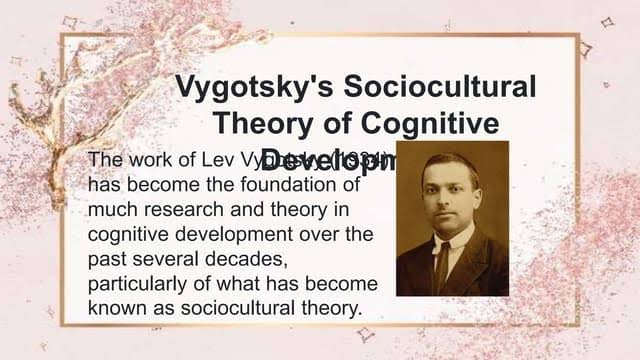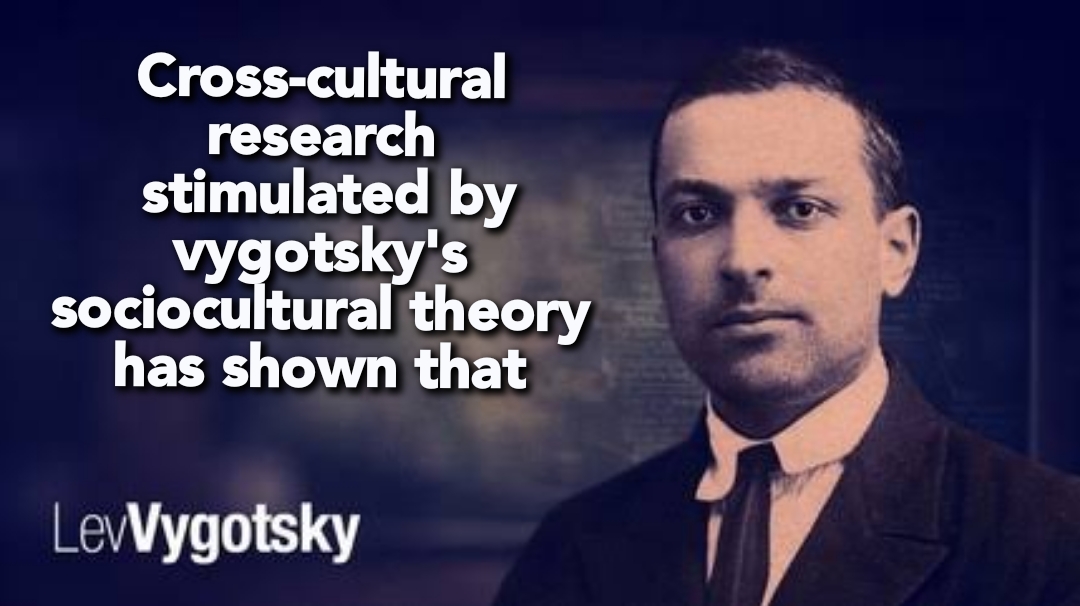Cross-cultural research stimulated by vygotsky’s sociocultural theory has shown that. What is Vygotsky’s sociocultural theory? Who is Lev Vygotsky? Alla answers below.
Cross-cultural research stimulated by vygotsky’s sociocultural theory has shown that
Cross-cultural research stimulated by vygotsky’s sociocultural theory has shown that :
- A. Reveals that the developmental sequences observed in Western cultures are universal.
- B. Culture affects children’s learning.
- C. Adults begin to encourage valuable skills as soon as children start school.
- D. sociocultural theory has little application outside of industrialized nations.
The cross-cultural research fostered by Vygotsky’s theory reveals that culture influences children’s learning.
Russian psychologist Lev Semenovich Vygotsky developed a theory of development known as the Sociocultural Theory of Cognitive Development. In his theory, he states that children’s cognitive development progresses through social interaction with more gifted individuals.
Who is Lev Vygotsky?
Vygotsky is one of the great educational theorists of the 20th century. His contributions have had an impact on our current models of education, and multiple conceptions applied to today’s pedagogy have emerged from his theories.
Vygotsky’s socio-cultural theory seeks to lay the foundations for the progressive construction of learning during the first years, with the help of the social context of the youngest.
What is Vygotsky’s sociocultural theory?
Cross-cultural research stimulated by vygotsky’s sociocultural theory has shown that: Vygotsky’s theory tells us humans how early learning develops slowly with the support of the child’s social context. Lev Vygotsky said that children slowly develop their learning through social interaction: They acquire new and better skills, as well as the logical process of immersing themselves in a routine and familiar lifestyle.
Likewise, this socio-cultural theory of cognitive development is concerned not only with how adults and peers influence individual learning through collaborative work, but also with how cultural beliefs and attitudes influence the way teaching and learning take place!
Of course, children still have a long period of brain development ahead of them, Vygotsky thought. At the same time, each culture provides what he describes as tools for intellectual adaptation. These tools allow children to use their basic mental skills in a way that is sensitive to the culture in which they grew up.

What is the Proximal Development Zone (ZDP)?
Cross-cultural research stimulated by vygotsky’s sociocultural theory has shown that – Vygotsky created three areas of development: the area of actual development, which represents students’ current abilities, the area of proximal development, in which students are being trained, and the area of potential development, which would be the level that the child can reach with the help of a person.
The zone of proximal development shows what exists between the subject’s current psychic development/the capacities the child has and the potential development they can learn through orientation. This is a very important situation in terms of education at all levels of education.
So, according to Vygotsky, the task of adults or older peers is to support, guide and plan the young child’s learning at an early stage. Thus, by internalizing the necessary behavioral and cognitive structures, they can master these aspects.
This has proven more helpful in helping children move through the Zone of Proximal Development (ZPD), which can be understood as the gap between what they can already do and what they cannot do on their own. / Cross-cultural research stimulated by vygotsky’s sociocultural theory has shown that.
How can we apply it in the classroom?
Vygotsky said that children learn more effectively in social environments. Therefore, learning to use social development theory in the classroom helps students grasp ideas faster.
According to Lev, social interaction plays a vital role in learning and encourages a reciprocal teaching style. For this reason, we have listed some tips below for you, valuable individuals, to apply this theory in the classroom;
- establish activities and games that stimulate the student’s zone of proximal development
- structure the activities by levels of difficulty during the learning process
- focus on collaborative work rather than individual work
- implement fun activities that facilitate social interaction. https://additioapp.com/fr/la-theorie-socioculturelle-de-vygotsky-comment-l-appliquer-en-classe/
Cross-cultural research stimulated by vygotsky’s sociocultural theory has shown that..
- What İs The Domain Of The Square Root Function Graphed Below?
- Control The Openings Of The Gas Exchanging Pores İn The Dermal Tissue System
- Which Of The Following Diseases Causes Damage To A Dog’s Nervous System?
- Pneumonia Oral Rehydration Therapy
- Methanol Ethanol And N-propanol Are Three Common Alcohols

 Number One Boats from USA. Boat Marketplace Group Network. All Boats & Yachts for Sale, Reviews, Specs, Prices, Craigslists.
Number One Boats from USA. Boat Marketplace Group Network. All Boats & Yachts for Sale, Reviews, Specs, Prices, Craigslists. 